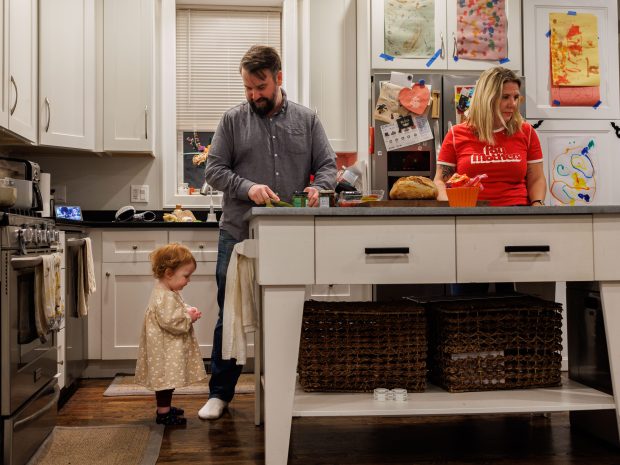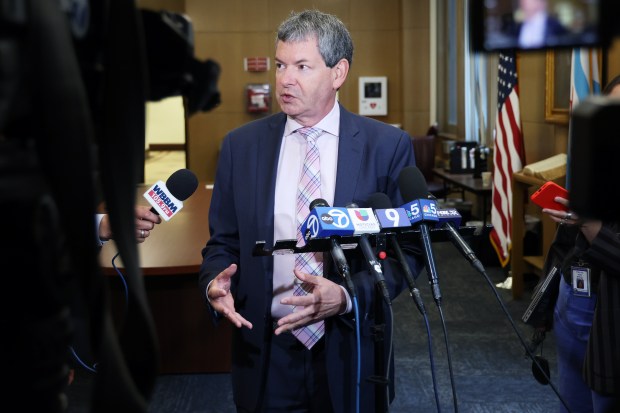Abby Schmeling was pleased to see child care come up as an issue during the recent presidential campaign.
Day care allows her and her husband to continue working full-time jobs with an 18-month-old daughter and a 4-year-old son. It also allows her children to develop with trained professionals and to socialize with classmates and teachers.
But finding affordable care is challenging. Equally important is finding care close by and where there’s not a prohibitively long waitlist, she said. Schmeling and her husband found care near their Avondale home and pay $54,000 a year for two kids.
And so Schmeling, who voted for Kamala Harris for president, listened to what the campaigns said about the issues that affect parents like her: child care costs, paid family leave. Though she felt like Harris had a more concrete plan to address child care costs than President-elect Donald Trump, she would have liked to see more specifics from both campaigns, she said.
“If we don’t support parents, we don’t support the next generation,” she said. “And if we don’t support the next generation, how is our country supposed to continue and thrive?”
To be sure, issues like the economy, immigration and personal liberties took center stage in the leadup to the election. But concerns of parents, like the price of child care and the availability of paid family leave, were a constant undercurrent.
Trump’s campaign included few policy specifics on these issues, though advocates point to key moments in the weeks leading up to the election for clues about what could be in store: Vice President-elect JD Vance suggested in an interview that the child tax credit could be raised. He has also said parents could lean on grandparents and family members for care, drawing consternation from advocates. Trump, when asked about child care policies in September, gave a rambling answer that veered off into discussion of tariffs.
Some say there could be a role for states like Illinois, where Democratic Gov. JB Pritzker, a vehement Trump critic, has aimed to make the state, in his words, “the best state in the nation for families raising young children.”
Even in some state races in Illinois this year, parenting factored in as a key piece of candidates’ campaign identities. Tosi Ufodike, who ran unsuccessfully as a Republican for state representative in the northwest suburban 51st District, campaigned on issues like cost of living and government spending, local control of education, and safety. But she said being a parent was a large part of her identity when she ran for office and that parental issues are also important to her. They often overlap with her economic concerns, she said.
Ufodike, who also runs a day care center, declined to say who she voted for, citing her role as a nonpartisan Ela Township trustee and her belief that voting decisions should be private. But she said Trump’s messaging around education curriculum, transportation and the price of gas, child care costs and transgender youth in sports — Trump campaigned on rolling back transgender rights — resonated with her.
“As a mom, parent, Republican, economy is always top (of my issues),” she said. “But also I’m a mom and it was a large part of my identity when I ran, so for me it’s kind of neck and neck. Parent issues have so much impact on economic issues because parents, we buy stuff, our kids go to school, we pay taxes, so it’s kind of hand in hand.”
For Schmeling, the key issues related to parents were the cost of child care, paid family leave and maternal health care, including access to abortion.
Child care, especially, is key, she said. It helps ensure her children are stimulated and learning, and without it she cannot be at her best for her job or her children. It ensures she can do creative and analytical work, helping her feel more fulfilled than if she stayed home full-time, she said.
Access to paid time off gave her time to learn how to care for her children and the ability to take her daughter to the pediatrician frequently when she was newborn and wasn’t gaining weight. It allowed her to take care of her own health, so she could better focus on her children, she said.
“We’re going to lose so much ground that we’ve made in just being more represented in the workforce,” she said, fearing the repercussions of a lack of affordable child care options.
Though many of Trump’s policies remain to be seen, her concerns as a parent extend beyond child care to a variety of other issues Trump raised on the campaign trail, like potential changes to health care and proposals that she fears could limit the rights of women and transgender people, all of which she worries about for her own children, she said. She also worries about comments Vance has made that she said reflect the view that women should largely stay home.
And, though she has access to child care and paid family leave, she worries about families without similar access.
Some 76% of working people in Illinois don’t have access to paid family leave, the National Partnership for Women and Families found in a 2024 report. About 62% of Illinois residents can’t access even unpaid leave through the federal Family and Medical Leave Act.
Meanwhile, enrolling an infant in full-time care at a day care center typically costs about 15.8% of the median family income in Illinois, the organization found.
“This was an election about the economy,” said Molly Day, chief operating officer of Moms First, an advocacy organization that sought to have child care addressed during the campaign. “Voters’ minds, as they went to the polls, were focused on costs. And for families today, child care is one of the largest line items.”
Day said there are ways the incoming administration can support families, like reauthorizing federal funding that goes to states to help low-income families afford child care, or revamping tax policies to help alleviate costs for parents.
But what, exactly, the new president plans to do remains largely to be seen, she and other advocates said. Many comments the incoming administration made during the campaign seemed “off the cuff,” with little comprehensive plan, said Keri Rodrigues, president of policy advocacy organization National Parents Union, whose political arm, the National Parents Union Action Fund, endorsed Harris for president.
For example, Vance’s comments that family members could help with child care reflects a plan that “doesn’t really alleviate the pain points for families,” she said.
One bright spot could be efforts to expand the child tax credit, a discount on families’ tax bill for each child in their care, she said. Trump expanded the credit during his first administration, and Vance suggested in an interview that it could be increased so that more parents could stay home with their children. But days before the election, Trump’s campaign declined to provide specifics on his plans for the credit except to say he would weigh significantly increasing it.
A bill that would have expanded the credit failed to advance in the Senate in early August. Vance, who was in Arizona visiting the U.S.-Mexico border, did not attend the vote.
During his first term, Trump signed into law a paid parental leave policy for federal employees, a measure highlighted by his daughter, Ivanka Trump, that was ultimately a pared-down version of efforts prioritized by Democrats.
On the other hand, the conservative playbook Project 2025 has proposed cutting Head Start, a federally funded program that provides early-childhood education and support to low-income families. Eliminating the program entirely would leave those families scrambling, Rodrigues said, especially in states that, unlike Illinois, lean red.
And increased funding for child care and pay for workers could help boost the availability of care sites, Rodrigues said.
“Frankly, it’s the blue states that invest more local and state dollars into education, so they’re not going to feel it as badly,” she said. “They’ll still feel it, but it’ll be nowhere as bad as it is in the red states.”
Cherita Ellens, president of Chicago-based Women Employed, which advocates for women in the workforce, said her organization will be looking to move aggressively at the state level, as federal parental policies remain uncertain.
She saw the groundswell of interest in policies that affect working parents as a continuation of the concerns highlighted when the pandemic closed day cares and schools, exacerbated what she views as failing care infrastructure, and left parents scrambling to balance their work and home lives.
“We are one of the only industrialized countries that doesn’t offer paid leave of some sort,” she said. “That doesn’t offer living wages, that just doesn’t have the policies in place.”
Trump’s prioritization of other issues during his campaign, like immigration and tariffs, has left Ellens wondering where paid leave and child care costs might fall on his to-do list while in office.
But the more vocal interest in these issues among voters has left her encouraged, she said. And there is opportunity to advocate at the state level, as what happens in Illinois could serve as a bellwether for Democratic states across the country.
“We are in defense mode at the federal level,” she said. “But in offense mode at the state level. (Trump) talked so much about state’s rights, this is our opportunity to make sure in Illinois we shore up as much as we can.”
The Associated Press contributed.





